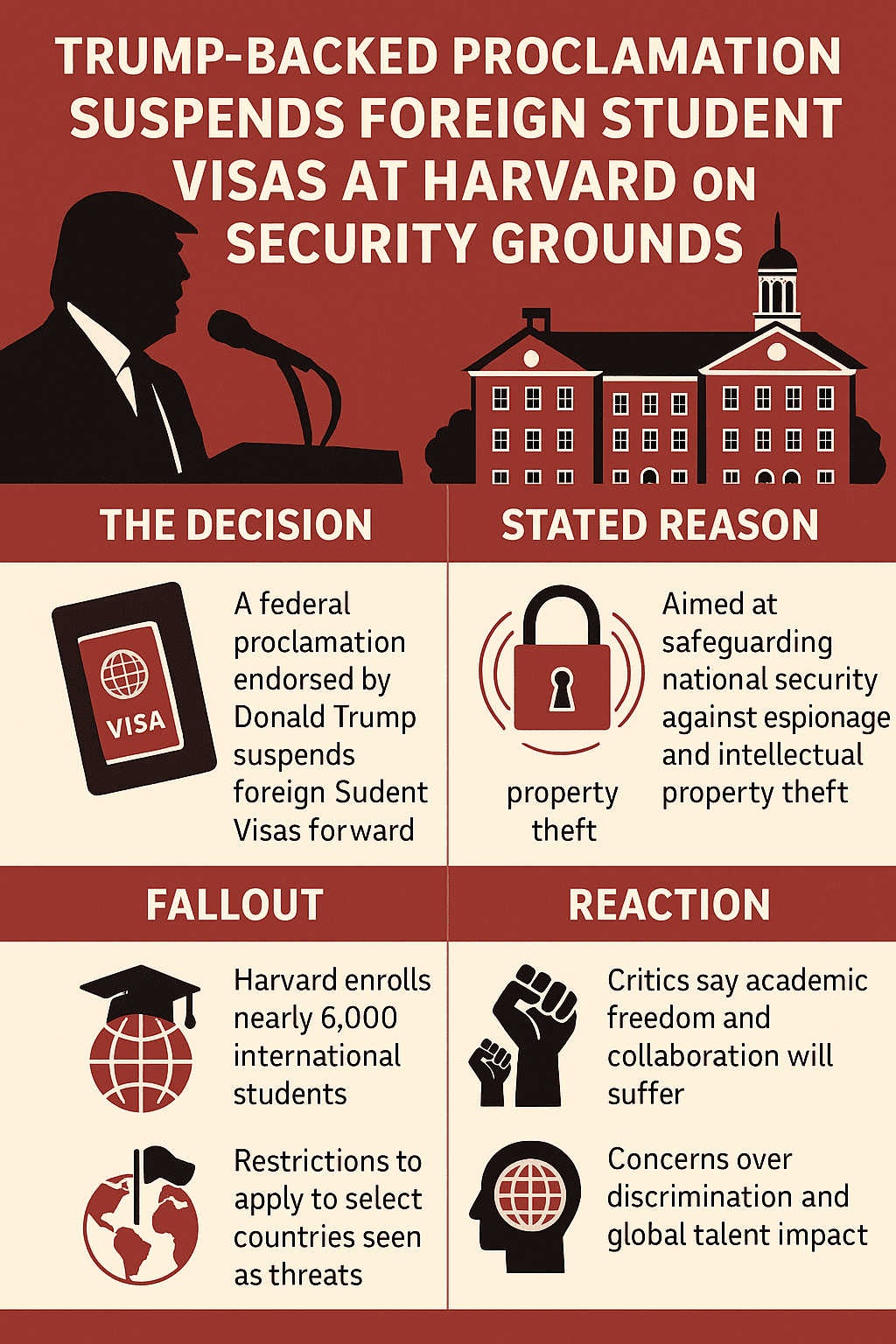Trump Administration Bars Select Foreign Students from Harvard: A National Security Move or Academic Blowback?
By Shylesh | Washington D.C. | June 5, 2025
In a sweeping decision that has already sent tremors through academic and diplomatic corridors worldwide, former President Donald J. Trump — now a key Republican figure ahead of the 2026 midterms — has reignited controversy by formally endorsing a federal proclamation restricting foreign student visas, specifically targeting institutions like Harvard University.
The directive, framed under the premise of safeguarding national security, is a resurrected version of Trump-era immigration controls and is already sparking sharp criticism from educators, global leaders, and civil rights groups.
What Happened?
On June 5, in an event attended by key Republican strategists and conservative think tank members, Trump publicly supported a proclamation that calls for a temporary suspension of new F-1 and J-1 visas for students from select countries enrolling in "sensitive research areas" at institutions deemed "strategically critical" — with Harvard University named explicitly.
The move mirrors national security measures Trump supported during his presidency, but this time, the focus is squarely on elite academia and its alleged vulnerability to foreign espionage, intellectual property theft, and undue foreign influence.
Why Harvard, and Why Now?
Sources close to the Trump camp claim the decision comes after intelligence briefings suggested increasing instances of academic programs being exploited by "hostile foreign actors" — an implicit reference to adversarial nations, most notably China and Iran. Harvard, often a lightning rod in political debates due to its liberal leanings and large international population, was labeled "a nexus of sensitive knowledge transfer" by senior GOP figures during the announcement.
The proclamation draws on previously classified intelligence assessments and Senate committee findings that cite "potential systemic abuse" of open academic policies by foreign governments seeking technological leverage.
Impact on Students and Institutions
Harvard enrolls nearly 6,000 international students from over 100 countries. The new directive will not revoke existing visas but halts the processing of new ones for the upcoming academic cycle for students from countries under “active scrutiny.” That includes students pursuing degrees in artificial intelligence, quantum computing, biotech, and national infrastructure studies.
In a statement released just hours after the announcement, Harvard President Claudine Gay called the policy "a direct affront to academic freedom and global scientific collaboration."
“This measure does not make our country safer — it only makes our institutions poorer in thought, innovation, and cultural exchange,” the statement read.
The Association of American Universities (AAU) also condemned the move, stating it would “discourage global talent, damage U.S. competitiveness, and fracture long-standing partnerships.”
International Response
China's Ministry of Foreign Affairs responded swiftly, calling the proclamation "blatantly discriminatory" and an act of "academic decoupling" from the global community. Iran and Russia also issued rebukes, warning of reciprocal restrictions.
European allies were more measured but equally concerned. The UK’s Department for Education expressed disappointment, stating that “academic cooperation must not fall victim to election-driven nationalism.”
Student Voices and Human Consequences
For students like Sahar Mehdi, an Iranian-born biotechnology graduate student at Harvard, the announcement felt “like a door slamming shut on a dream.”
“I spent years preparing to be part of Harvard’s neuroscience lab. Now, I may never even set foot on campus,” she said via Zoom, choking back emotion.
Social media platforms have since lit up with the hashtag #LetScholarsIn, with students and alumni demanding that academic merit not be overshadowed by geopolitics.
 Political Fallout and the 2026 Agenda
Political Fallout and the 2026 Agenda
While Trump no longer holds office, his influence on immigration discourse remains potent. Republican contenders for the upcoming elections have quickly aligned themselves with the move. Senator Tom Cotton praised the restriction as “a bold step in restoring American intellectual sovereignty.”
Conversely, Democrats have blasted the measure as xenophobic and shortsighted. Senator Elizabeth Warren (D-MA), in a fiery Senate speech, said, “This is not about national security — it’s about weaponizing fear against the world’s brightest minds.”
Political analysts suggest the move may energize Trump’s base while alienating moderate voters, especially in university towns and high-tech industry hubs.
The Bigger Picture: Security vs. Scholarship
The debate raises profound questions: Where should a nation draw the line between securing critical technologies and remaining a hub for global innovation? Can America remain a leader in science and research if its gates close on foreign scholars?
While the administration insists this is a “surgical strike,” many worry about collateral damage to academia, innovation pipelines, and U.S. moral standing.
“It’s not just about Harvard or visas,” said Dr. Maria Chao, a former State Department analyst. “It’s about how we define our values in a connected, competitive world.”
Conclusion
Trump’s visa proclamation targeting foreign students at Harvard reignites a perennial American debate: nationalism versus globalism, protection versus openness. As campuses brace for fallout, and diplomatic ties tense, the world watches to see whether U.S. higher education will remain an open beacon or retreat behind national security lines.
One thing is certain — the classroom has once again become a battleground.